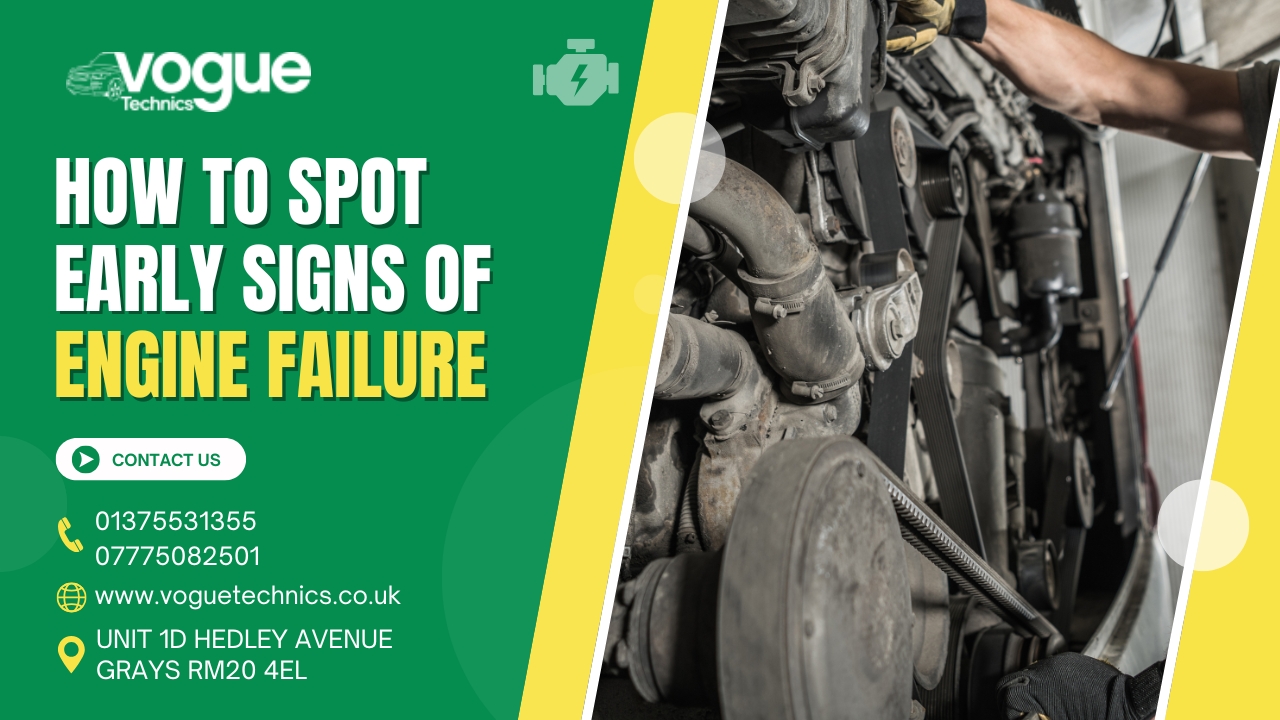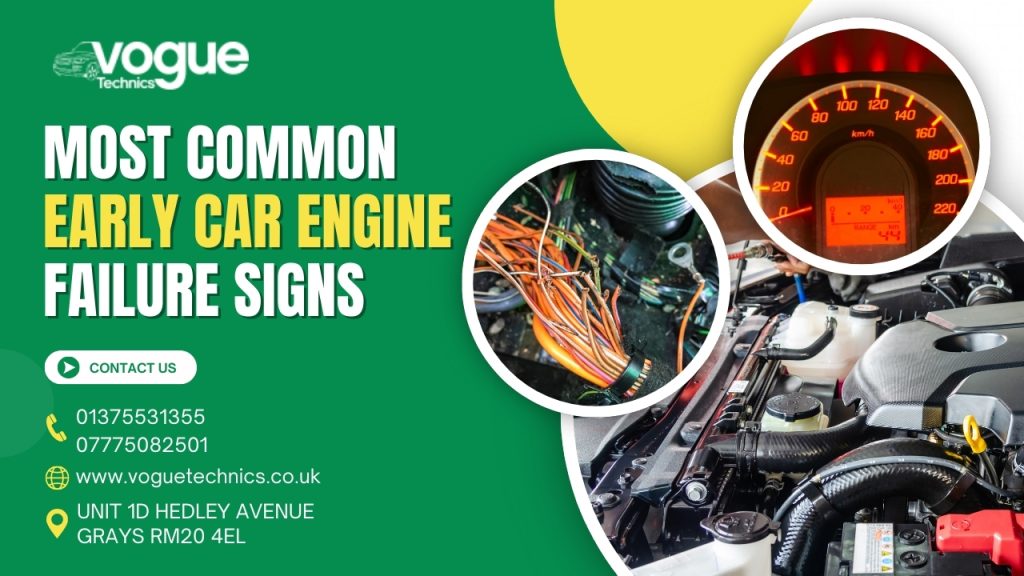
With automobiles, your engine is the heart of the beast. Healthy, and everything hums along famously. Unhealthy? Well, you're stuck on the hard shoulder, frustrated with yourself for not noticing the warning signs. Noticing car engine failure signs in advance will spare you a world of hassle, expense, and humiliation (because no one likes to call a tow truck on a rainy day).
Let's jump into the early warning signs of engine failure so you'll understand when your car is attempting to whisper; or scream for assistance.
Why Paying Attention Matters
Imagine your engine being your body. You wouldn't brush off chest aches, would you? Similarly, neglecting car engine failure signs may result in disastrous breakdowns. Engines don't just die for no reason; they drop hints. The secret is catching them before the trail ends up costing a fortune in repairs.
The Most Common Early Car Engine Failure Signs

1. Dashboard Drama – Warning Lights don't Lie
The check engine light overheating symbol is essentially your vehicle's SOS call. When it appears, don't wave it away. Of course, sometimes it's nothing serious, like a loose fuel cap, but it might indicate your engine's on the verge of a breakdown.
- Flickering lights = wiring problems.
- Solid warning = stop in denial.
- Flashing check engine = pull over ASAP!
2. Strange Noises – When Your Car Starts Talking Back
Engines are meant to hum, not sing death metal. Knocking, ticking, grinding, or clunking noises are tell-tale car engine failure symptoms.
- Knocking: could be worn bearings.
- Squealing: often a loose belt.
- Grinding: usually linked to failing parts inside.
If your car sounds like a band tuning up badly, you’ve got a problem.
3. Smoke Signals – Exhaust Tells Tales
Too much smoke out of your exhaust isn't only embarrassing—it's a neon warning sign flashing possible engine failure risks.
- Blue smoke = oil burn.
- White smoke = coolant leakage.
- Black smoke = fuel system problems.
Engines don't billow like steam trains just for entertainment. If your engine does, schedule a check-up.
4. Overheating – The Silent Engine Killer
Ignore an overheating engine once, and you’re already flirting with disaster. The engine light overheating icon usually appears when temperatures soar beyond safe limits. Causes?
- Low coolant.
- Broken radiator fan.
- Clogged water pump.
Driving with an overheating engine is like running a marathon in a wool jumper, it won’t end well.
5. Poor Performance – When Your Car Feels Sluggish
If your vehicle has trouble accelerating, keeps stalling, or is burning more fuel than it normally would, you might be experiencing premature car engine failure symptoms. Consider it your engine struggling to breathe.
6. Oil Leaks and Unusual Odors
Notice oil puddles under your vehicle? Catch a whiff of burning near the hood? These are stereotypical car engine failure symptoms. Oil is the lifeblood of your engine. So, if it's leaking, the engine's starving.
7. Rough Idling and Misfires
The engine of a healthy vehicle should idle smoothly. If yours is jerking around like it's had too many espressos, that's not good. Misfires, shaking, and rough idling usually indicate clogged fuel injectors or worn spark plugs. Put your head in the sand, and you're headed toward engine failure hazards.
What Happens If You Ignore Early Symptoms
Think of ignoring these warnings like skipping dentist visits. You’ll end up with a root canal (or worse). With engines, small issues snowball fast:
- Overheating = warped cylinder heads.
- Knocking = total engine rebuild.
- Oil leaks = seized engine.
Yes, engine failure can cost more than the car itself.
How Different Engines Show Warning Signs
Every car engine type has its quirks. Whether you’re driving a city hatchback or a luxury beast, here’s how they differ:
BMW engines often give early warnings through overheating and oil leaks.
Audi engines may show misfires and electrical hiccups before total engine failure.
Range Rover engines are notorious for coolant leaks and white smoke. Ignore it, and you’re in deep trouble.
See how knowing your engine's personality simplifies finding car engine failure symptoms.
Prevention Tips to Prevent Engine Failure
Airight, prevention time. Finding symptoms is one thing, but maintaining your engine's health is another. Here's your cheat sheet:
- Regular Oil changes.
- Top up coolant.
- Don't dismiss warning lights.
- Pay attention to unusual noises.
- Adhere to service schedules.
Easy, isn't it? Give your engine a good life, and it'll pay you back.
When to See a Mechanic Immediately
At times you can limp, but at others, pull over. Call the professionals if:
- You notice the engine light overheating.
- The engine is knocking severely.
- There is constant thick smoke.
- The performance of your car drops drastically.
Ignoring these signs is like playing Russian roulette with your wallet.
The Human Side of Car Care
Cars have personalities. They're needy, they're low-maintenance, but they all attempt to communicate with us when they're in pain. Paying attention to car engine failure signs isn't about being a mechanic; it's about listening.
FAQs About Engine Failure
Q1: What is the most frequent reason for engine breakdown?
A: Neglecting maintenance, particularly avoiding oil changes. It's like performing a marathon on an empty stomach.
Q2: Can an engine unexpectedly break down without warning?
A: Not often. The engine failure signs in cars typically accumulate over time. You just have to identify them.
Q3: Is an overheated engine always serious?
A: Yes. The engine light overheating advice is to stop driving and repair immediately.
Q4: Can oil leaks actually lead to complete engine failure?
A: Yes. Oil lubricates parts. Without it, your engine locks up.
Q5: How long is a car gonna last with signs of early engine failure?
A: It varies, but riding it out typically results in costly repairs. Best to address it early.
Final Thoughts
To catch the signs of engine failure early is not rocket science. It's just common sense with a dash of awareness. Your car does not wish to catch you off guard with some dramatic failure; it gives hints, nudges, and even full-blown warning screams.
So the next time there is a knocking sound, you see smoke, or catch that annoying engine light overheating logo, don't ignore it. Listen, act, and keep your car engines purring like the sophisticated machines they are.
Because let's be real; your sanity and wallet will appreciate it later.